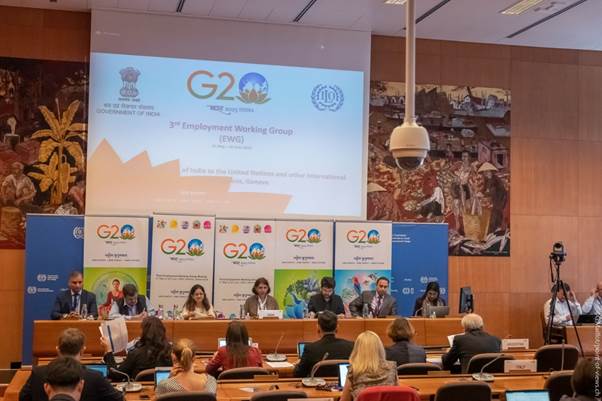

Second day of the G20 Employment Working Group (EWG) meeting started with a special session dedicated to the follow-up of implementation of commitments made during India’s G20 presidency to develop an international reference classification of occupations and skills.
The Secretary, Labour & Employment, Ms. SumitaDawra, highlighted that the first step towards realization of the long awaited global skill harmonisation has been taken with ILO and OECD having prepared the draft terms of reference (ToR) of the feasibility study for international reference classification. The feasibility study,spanning two years, will include a pilot in select sectors, including IT, care and green sectors.
The Indian delegation highlighted the need for G20 countries to work towards the G20 EWG commitment of Indian Presidency in 2023 for incorporation of basic and extended indicators in respective national surveys for mapping global skills gaps. This classification of occupations and skills has the potential to benefit developed, developing and least developed nations alike.
Joint Secretary Sh Rupesh Thakur presented that upon completion, the global framework will cater to the anticipated immediate, medium and long term skill requirements of G20 countries and beyond. It will open up a world of employment opportunities to the workers of G20 countries especially emerging economies like India and Brazil. It will enable demand-based employment mobility, fostering a more interconnected and efficient global job market.
Further sessions were on critical issues of the impact of care policies and equal pay in promotion of gender equality in the world of work were deliberated upon at the forum. The EWG acknowledged the challenges faced by women due to disproportionate caregiving responsibilities and the necessity of supportive care policies.
India's pro-active approach and steps in this direction were highlighted:
Another key agenda taken up was theissue of pay disparity between genders. The Indian delegation enunciated the Government's efforts which have aided in the notable decrease in the gender pay gap in India.
The meeting concluded with comprehensive discussions on equality in the world of work. It was emphasized that equality is economic necessity not just a moral obligation. On this issue, India's multifaceted approach to enhancing female participation in the workforce on an equal footing was highlighted. Legislative and schematic interventions, such as the National Education Policy 2020, Skill India Mission, and schemes for women in STEM fields, were elucidated. The Government of India's historic move to reserve one-third of seats for women in the House of People (Lok Sabha) and in the State Legislative Assemblies in 2023, and efforts to increase women's representation in armed and police forces were well received by the forum.
The meeting concluded with a strong reiteration of the collective resolve of the G20 countries to continue working towards, advancing gender equality, diversity at workplace and social security.